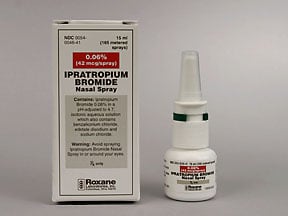
Ipratropium Coupons & Savings Card – Discount Prices from $17.61
My prescription
Edit
15ML of 0.06%, Ipratropium (1 Bottle)
Select pharmacy

CVS
$22.18
COUPON PRICE
Walgreens
$17.61
COUPON PRICE
Albertsons
$19.11
COUPON PRICE
Walmart
$20.64
COUPON PRICEIpratropium savings card
Show this card to your pharmacist
Walgreens
$17.61
BIN
ID
PCN
GRP
015995
LHKPU488259
GDC
DR33
Powered by
More prescriptions for copd
More prescriptions for copd
Ipratropium dosage forms
Dosage Quantity Price from Per unit 0.5GM 1 Bottle $126.33 $126.33 0.5GM 2 Bottles $271.65 $135.82 0.5GM 3 Bottles $416.97 $138.99 15ML of 0.06% 1 Bottle $20.64 $20.64 15ML of 0.06% 2 Bottles $26.06 $13.03 15ML of 0.06% 3 Bottles $37.94 $12.65 30ML of 0.03% 1 Bottle $20.85 $20.85 30ML of 0.03% 2 Bottles $34.66 $17.33 30ML of 0.03% 3 Bottles $38.85 $12.95
| Dosage | Quantity | Price from | Per unit |
|---|---|---|---|
| 0.5GM | 1 Bottle | $126.33 | $126.33 |
| 0.5GM | 2 Bottles | $271.65 | $135.82 |
| 0.5GM | 3 Bottles | $416.97 | $138.99 |
| 15ML of 0.06% | 1 Bottle | $20.64 | $20.64 |
| 15ML of 0.06% | 2 Bottles | $26.06 | $13.03 |
| 15ML of 0.06% | 3 Bottles | $37.94 | $12.65 |
| 30ML of 0.03% | 1 Bottle | $20.85 | $20.85 |
| 30ML of 0.03% | 2 Bottles | $34.66 | $17.33 |
| 30ML of 0.03% | 3 Bottles | $38.85 | $12.95 |
Ipratropium Warnings
The following information outlines critical safety warnings associated with the use of ipratropium bromide. It is essential to understand these risks and take necessary precautions. If you have any concerns, please consult your healthcare provider.
Severe Allergic Reactions: There is a possibility of experiencing a severe allergic reaction, which can be life-threatening. Symptoms include facial swelling, shock, and anaphylaxis, characterized by a closing of the throat. If you experience hives, rash, red skin, swelling of the lips or tongue, or difficulty breathing after using ipratropium bromide, seek immediate medical attention. Individuals with a history of allergies to other medications or foods should be particularly cautious.
Bronchospasm (Narrowing of Airways): Although rare, ipratropium bromide may induce muscle spasms in the lungs, leading to breathing difficulties, wheezing, coughing, or chest discomfort. If you experience shortness of breath after using this medication, seek medical assistance without delay.
Eye and Vision Concerns: Ipratropium bromide may increase eye pressure, posing a risk, especially for individuals with glaucoma. If you have glaucoma or other eye issues, consult your eye care provider before using this medication. Avoid contact with the eyes to prevent eye pain, discomfort, blurry vision, or other vision changes.
Urination Difficulties: Use ipratropium bromide with caution if you have prostate issues, as it can exacerbate these conditions and lead to urination difficulties. If you notice such symptoms, contact your healthcare provider. This risk is elevated in individuals with an enlarged prostate or bladder-neck obstruction.
Contraindications:
- Severe Allergy to Anticholinergic Medication: Do not use ipratropium bromide if you have a known severe allergy to anticholinergic drugs, as this may result in serious health risks. Always consult your healthcare provider for guidance.
Ipratropium Side Effects
Common side effects:
- Bronchitis
- Upper respiratory tract infections
- Shortness of breath
- Headache
- Cough
- Nausea
- Dry mouth
- Constipation
Less common but important to monitor:
- Pain
- Sore throat
- Flu-like symptoms
- Back pain
- Chest pain
- Runny nose
- Arthritis
Serious side effects:
- Sudden worsening of breathing problems
- Fast or pounding heartbeat
- Difficulty or painful urination
- Severe allergic reactions
- Eye pain
- Swelling, redness, or vision changes
Ipratropium Interactions
When using ipratropium, it's important to be aware of potential interactions with other medications and certain health conditions. Ipratropium is an anticholinergic agent, and combining it with other drugs that have anticholinergic properties can enhance side effects such as dry mouth, blurred vision, and difficulty urinating. Medications that may interact include other anticholinergics like Scopolamine, Trihexyphenidyl, and Glycopyrrolate. Additionally, combining ipratropium with beta-adrenergic agonists, such as Albuterol, can increase the risk of cardiovascular side effects like palpitations and elevated heart rate.
Certain health conditions can also influence how ipratropium affects your body. If you have narrow-angle glaucoma, using ipratropium may worsen your condition by increasing intraocular pressure. Similarly, individuals with urinary retention issues or an enlarged prostate should use ipratropium cautiously, as it may exacerbate these problems.
To minimize risks, inform your healthcare provider about all medications you're currently taking, including over-the-counter drugs and supplements. Discuss any existing health conditions to ensure that ipratropium is safe for you. Always follow your healthcare provider's instructions regarding medication use and report any unusual symptoms promptly.
